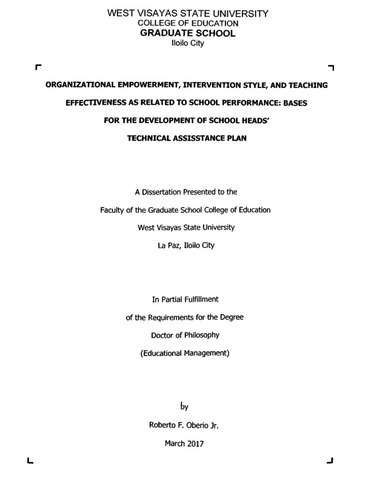Organizational empowerment, intervention style, and teaching effectiveness as related to school performance: Bases for the development of school heads' technical assistance plan
Share
Zusammenfassung
This survey-correlational study aimed to ascertain the organizational empowerment, intervention style, teaching effectiveness, and school performance of selected teachers and school heads in the Department of Education in the province of Iloilo. It likewise aimed to find out whether these variables were related significantly. Conducted on September 2016, the participants of the study were the 271 randomly selected teachers and 84 school heads who were selected using the two-stage random sampling method. Three (3) data-gathering instruments were adapted to gather the needed data for the study: the Organizational Empowerment Scale by Mathews, Diaz, and Cole (2003); the Intervention Styles Questionnaire by Heron (2001); and the Questionnaire on Teacher Effectiveness for Teachers by Mishra. Ratings of the teachers and school heads in their Individual Performance Commitment and Review Form (IPCRF) for school year 2015- 2016 were utilized. Mean, standard deviation, and rank were employed as descriptive statistics, while Pearson's rand coefficient of determination, both set at .05 alpha level of significance, were used as inferential statistics. All computations were processed through the Statistical Package for the Social Sciences (SPSS) software. Study results revealed that generally, the school heads were highly empowered in all factors of organizational empowerment; Their dominant authoritative intervention style was confronting intervention (CO) which was rated as highly confronting while their dominant facilitative intervention style was supportive intervention (SU) which was rated as highly supportive. Teachers on the other hand was found to be highly effective while the school performance of public elementary schools was very satisfactory. Positive and significant relationship existed between the following: dynamic structural framework (DSF) and authoritative intervention; dynamic structural framework (DSF) and facilitative intervention; control of workplace decision (CWD) and authoritative intervention; control of workplace decision (CWD) and facilitative intervention; fluidity in information sharing (FIS) and facilitative intervention; authoritative intervention and school performance; and facilitative intervention and teaching effectiveness. On the other hand, positive and not significant relationship existed between the following: dynamic structural framework (DSF) and teaching effectiveness; fluidity in information sharing (FIS) and teaching effectiveness; fluidity in information sharing (FIS) and school performance; and authoritative intervention and teaching effectiveness.
Recommended Citation
Oberio, R. F. (2017). Organizational empowerment, intervention style, and teaching effectiveness as related to school performance: Bases for the development of school heads' technical assistance plan [Doctoral dissertation, West Visayas State University]. WVSU Institutional Repository and Electronic Dissertation and Theses PLUS.
Type
DissertationKeywords
Schlagwort
Degree Discipline
Educational ManagementDegree Name
Doctor of Philosophy in EducationDegree Level
DoctoralPhysical Description
xiii, 220 p.


